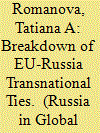|
|
|
Sort Order |
|
|
|
Items / Page
|
|
|
|
|
|
|
| Srl | Item |
| 1 |
ID:
186776


|
|
|
|
|
| Summary/Abstract |
The article aims to explore the causes and consequences of the profound
change in transnational ties between Russia and the European Union after
February 24, 2022, that is, contacts that bypass official authorities and
directly involve Russian and EU citizens (in business, science, education,
culture, sports, and non-governmental organizations’ activities). The
breakdown of ties is unique in speed and scale. Five causes of the breakdown
of transnational ties have been identified: the position of EU officials
towards Russian society; the rise of the war paradigm in the West and its
pluralization (that is, its implementation on different tracks); reputational aspects; the perception of Russian society as homogeneous in supporting
the operation in Ukraine; and pressure from Ukraine itself. As a result,
relations between Russia and the EU have become more politicized and
have lost the potential for resilience and mutual socialization. By limiting
transnational ties, EU players help Russia’s ruling elite consolidate society
and limit alternative thinking; they also change the vector of EU civilian
power. At the same time, the rupture of transnational ties delivers a major
blow to the universality of Western institutions, which will determine the
pace of recovery both for Russian supporters of close relations with the West
and for their opponents. The article also pinpoints certain mechanisms for
rebuilding transnational ties in the medium term.
|
|
|
|
|
|
|
|
|
|
|
|
|
|
|
|
| 2 |
ID:
170600


|
|
|
|
|
| Summary/Abstract |
This article examines the impact of the crisis in Russia-EU relations on the European Union’s articulation of the resilience concept and analyzes how its incorporation into the EU Global Strategy has affected the Brussels-Moscow relationship. Academic concepts of resilience and constructivism provided the theoretical basis for the research. The study of academic works made it possible to identify basic characteristics of resilience. This is an analytical (not normative) attribute of any system, and it is focused on the resources needed to overcome threats rather than on threats as such, with both threats and resources being inherent in the system. The study of the European Union’s discourse shows that it has interpreted of resilience as a new norm (ascribed to democratic regimes only), with emphasis on threats rather than resources. These differences were caused, among other things, by the ongoing crisis in relations between the EU and Russia. Resilience as a new norm allows the EU to emphasize Russia’s “otherness” and thus assert its own identity as a normative leader. The focus on threats sets out a clear action plan for fighting threats associated with Russia. In Eastern Europe, resilience based on common threats emanating from Russia reinforces the EU’s approach towards transformations launched in these countries earlier. So, despite its theoretical potential, resilience, as construed by the European Union, does not allow Russia and the EU to overcome the current crisis in their relations.
|
|
|
|
|
|
|
|
|
|
|
|
|
|
|
|
|
|
|
|
|